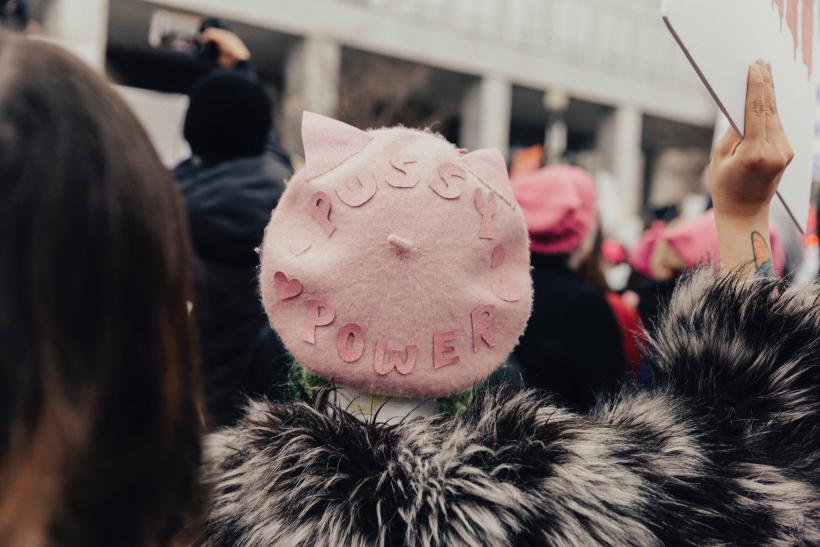
Photo by roya ann miller on Unsplash
Recently a dude tried to explain to me that I wouldn’t be a feminist if I weren’t fat. “How many thin fat activists do you see?” he asked rhetorically with a smug look on his face. I replied, “Well quite a few, actually.” He then explained that I had misunderstood him (of course I had!).
I was a smidge unclear on what his clumsy word choice was attempting to convey to me, but I think I understood the jist of his misperception: according to him, if I were a beneficiary of the diet industrial complex (D.I.C.), I would see nothing wrong with it. I guess we’ll never know, girl!
But I’d like to believe that even if I were killing it at the sexism rodeo, I’d lift my tiny coiffed head and see that something wasn’t quite right in Brolandia.
That dude’s theory – patronizing, myopic, and boring as it was — is not new to me. I’m no stranger to the fact that the word “feminist” is an epithet in this culture. It’s not an accident that people who publicly believe in and fight for gender liberation have been maligned since the days of Ida B Wells.
Women who are feminists are often masculinized and body shamed; our politics are reduced to the product of our failure to conform to misogynist standards of beauty or desirability. This manipulative tactic seeks to (1) discredit and alienate conscientious people, (2) intimidate those who might otherwise want to be involved while also (3) keeping them in check by creating a false sense of safety that they’re slightly better than visible activists. This tactic also (4) reinforces the hierarchical paradigm that positions male approval as the “true” source of all women’s behavior.
Even though our politics were largely identical, I couldn’t help but notice that my thin friends were much likelier to have their views legitimized and taken seriously. I noticed that where I was perceived as “aggressive,” they were perceived as “interesting.”
People invested in unjust ideologies often reduce fights for justice to the petty protestations of jealous people. This has been a tactic used to silence people of color during the Civil Rights Movement, poor people during various movements for economic justice, the anti-gentrification movement, women throughout the history of feminism, and queers during gay liberation. Failure is constructed as the motivation for what are in fact truly amazing gestures of human freedom.
What I’ve noticed is that self-identifying as a feminist or an activist bears a different social cost depending on your body size.
The first time I saw this was in college. I was surrounded by feminists with strong views. Even though our politics were largely identical, I couldn’t help but notice that my thin friends were much likelier to have their views legitimized and taken seriously. I noticed that where I was perceived as “aggressive,” they were perceived as “interesting.” I noticed they had an easier time finding jobs and internships.
I wondered if they noticed the difference. And, I’ll admit, I wondered if they saw the approval and opportunities they got as conditional upon their body remaining a non-threatening size. It’s always easier to theoretically support a radical idea than it is to actually interrogate our investments and change them, right?
You Might Also Like: 8 Things Strong, Feminist Women Do WAY Differently
I recently had a telling conversation with a friend who has long been a feminist. When we met she was thin and dating a thin dude who supported her feminism deeply. He used to read and share feminist books with her, and they spoke about anti-sexist work frequently… until fat positivity entered the picture. She realized how much time and energy she was dedicating to controlling her weight and decided she didn’t want to keep doing it. She expected her boyfriend to be as supportive as he always had been. Except he wasn’t. All of a sudden her politics were visible on her body in a way they hadn’t been before – and in a way that visibly implicated him (because under misogyny, his girlfriend’s body became part of his worth and social standing among other men). Not long after she stopped dieting and gained weight, he ended the relationship.
I’ve talked to others who have lost friends, affection, jobs, and respect when their feminism began to affect the size of their bodies.
There are dozens of examples of this playing out. People with more palatable bodies/features/attitudes can often espouse more radical views because they are not seen as representing imminent threat. I too have been a beneficiary of this at times – because of my education level, gender presentation, or my size relative to others in the fat movement.
This differential treatment is characteristic of bigotry. No one should have to worry about losing things like love, respect, jobs, legitimacy, and friendships because of their body size.
Our bodies become part of someone else’s narrative frequently because our autonomy is undermined at every turn.
I want to call for a recognition of this phenomenon. It is a feminist act to be honest, to look critically at potentially divisive cultural forces, and to have hard conversations about how to take care of the people who are paying a higher price for fighting for change that benefits all of us.








